
Throughout human history, stoicism, or the endurance of pain or discomfort without complaint, was a trait people admired. That forbearance was the mortar of civilization, helping to build nations, and sustaining societies in times of distress.
For men, that fortitude meant shouldering the burden of supporting a family and going to work no matter how sick you were. Over time, we’ve come to understand that even though that intention might have been admirable, it might have been ill-advised. A healthier father or husband is better for the family than an incapacitated one.
Given the surge in information about our health, healthful food options, and the advances in medicine, there is no reason in today’s world why men should not avail themselves of these choices.
Even so, whether they see it as a cultural stigma, a sign of weakness, or a reminder of their own mortality, men remain reluctant to seek information and help pertaining to their health — many even refuse tests that could prevent a condition from becoming serious.
That should not be the case, according to Dr. R. Robert Dhir, board-certified urological surgeon in Houston and Clear Lake, Texas, “A man should always know when to seek help,” said Dhir. “Doctors have so many resources to diagnose and treat numerous conditions. Delaying this process can be detrimental to longevity. If you have a suspicion that something might be wrong, take action and be proactive with your health.” Be aware that men’s symptoms can be different than women’s. These are 20 health problems that afflict more men than women.
Men are becoming more aware of the importance of health, and in fact, there are magazines and periodicals devoted to the subject. 24/7 Tempo is doing its part by compiling a list of 50 health tips every man should know.
Click here for 50 health tips every man should know

1. Don’t wait for your partner to drag you to the doctor
Men seem to be reluctant to see a doctor when they have health problems. “Most men I see have come to see me because their wives pushed them,” said Dr. Amit Mehta, a family medicine physician at Geisinger Health System, a regional health care provider in Pennsylvania and New Jersey. Mehta tells of a male patient who came to see him because of his wife, and “[w]ithin three weeks he had a triple bypass.”
[in-text-ad]

2. Don’t treat doctors as strangers
“As a urologist, I find that most men feel their symptoms are difficult to talk about with anyone, much less with a complete stranger,” Dhir said. No one knows your body and what’s normal for it better than you. You have to be an open book about your symptoms — all of them.

3. See your doctor at least once a year
“Men tend to be a bit stubborn and prone to brushing things under the rug,” Dhir said. This has to do with why we typically get a significant delay in men seeking medical care in comparison to women, he noted. “In general, adult males should see their doctor at least once a year for a physical exam.” For men between 18 and 39, the recommendation by the National Institutes of Health is to check their blood pressure at least once every two years, their cholesterol every five years, and their eyes every year.

4. See your doctor more often as you age
“Men are like cars, as we age we will unfortunately be in the shop more often,” Dhir said. Aging is a risk factor for many conditions, including weight gain as one’s metabolism slows, and brain atrophy. The bones become more fragile, and the risk of cancer increases exponentially — half of cancers develop in people over 65. Get screened for various conditions, and depending on the results, you may have to go for checkups a few times a year. “Some men will require specialists as they age for routine preventative screening for conditions like colon cancer; or they may need a cardiologist for a stress test,” Dhir added.
[in-text-ad-2]

5. Screen for low testosterone
“I like to screen for low testosterone, or hypogonadism, in any aged male who presents with symptoms of Low T,” Dhir said. Symptoms include chronic fatigue, low libido or sex drive, troubles getting or keeping an erection, or significant weight gain, he noted. All men with these types of symptoms should get a proper workup, he added, “as hormone optimization can be quite beneficial for men in the long term.” Newer evidence shows that keeping optimal testosterone levels over long periods of time can help prevent many chronic diseases like heart disease and diabetes, Dhir explained. Biting your nails and other symptoms may be signs of these and more health problems.

6. Do research online
“As a physician, I encourage online research for my patients as it means they are invested in their health and want to find out how to prevent or fix a problem,” Dhir said. On the flip side, he added, there is a lot of pseudoscience available online and it can be quite confusing and misleading to the average patient.
[in-text-ad]

7. But don’t take Dr. Google’s word for it
In the internet age, all symptoms can be easily researched and investigated via “Dr. Google,” Dhir noted. “Men who self-diagnose do so because it is more convenient to get online versus schedule a visit with a physician and potentially miss work.” But self-diagnosis can be dangerous. “Although you may be informed about your symptoms and possible causes, you should always confirm suspicions by consulting with your doctor.” What if you’re wrong? These are 25 health symptoms people always ignore but never should.

8. Get even mild urinary symptoms checked out
Mild urinary symptoms should at the very least be mentioned to your primary care doctor during a yearly physical. “As men age, there can be some bothersome urinary symptoms that can begin to present usually in the late 40s and early 50s,” Dhir said. “This could be a slightly weaker urinary stream or possibly waking up at night to urinate when previously sleep was never interrupted.”
If those urinary symptoms progress and possibly worsen, it is definitely time to see a urologist for evaluation and workup, he noted. “Most of the time, a diagnosis of benign prostatic hyperplasia (BPH) is made and treatment options are provided.” Less frequently, but possible, the urinary symptoms could be a sign of something more complex such as an infection, scar in the urethra, tumors of the bladder or prostate, or even kidney stone disease, Dhir explained.

9. Don’t resists that colonoscopy
Resistance to getting a colonoscopy is very common among men, Mehta noted. “I always struggle to convince men to get it.” It’s important to get screened, even if only because men have a slightly higher risk of developing colorectal cancer than women — one in 22 for men compared with one in 24 for women, according to the American Cancer Society. Early detection can significantly improve the chance of beating several types of cancer, including of the colon.
[in-text-ad-2]

10. Screen for prostate cancer
“As we age, it is important to screen for colon cancer at age 50 and screen for prostate cancer around that same time,” Dhir said. “If you have a family history of prostate cancer you may consider starting screening 5 years earlier.” Prostate cancer is the second most common type of cancer in men and a leading cause of death worldwide. These are the most common cancers in men and women.

11. Know what to do to prevent ED
meta>image-subject=overweight man doctor
Healthy diet and regular cardio exercise are the keys to preventing erectile dysfunction, Dhir explained. “Sedentary lifestyles will typically be more prone to ED, as will being overweight.” Also, he noted, if testosterone levels are lower than normal, replacement therapy can be helpful in preventing ED issues.
[in-text-ad]
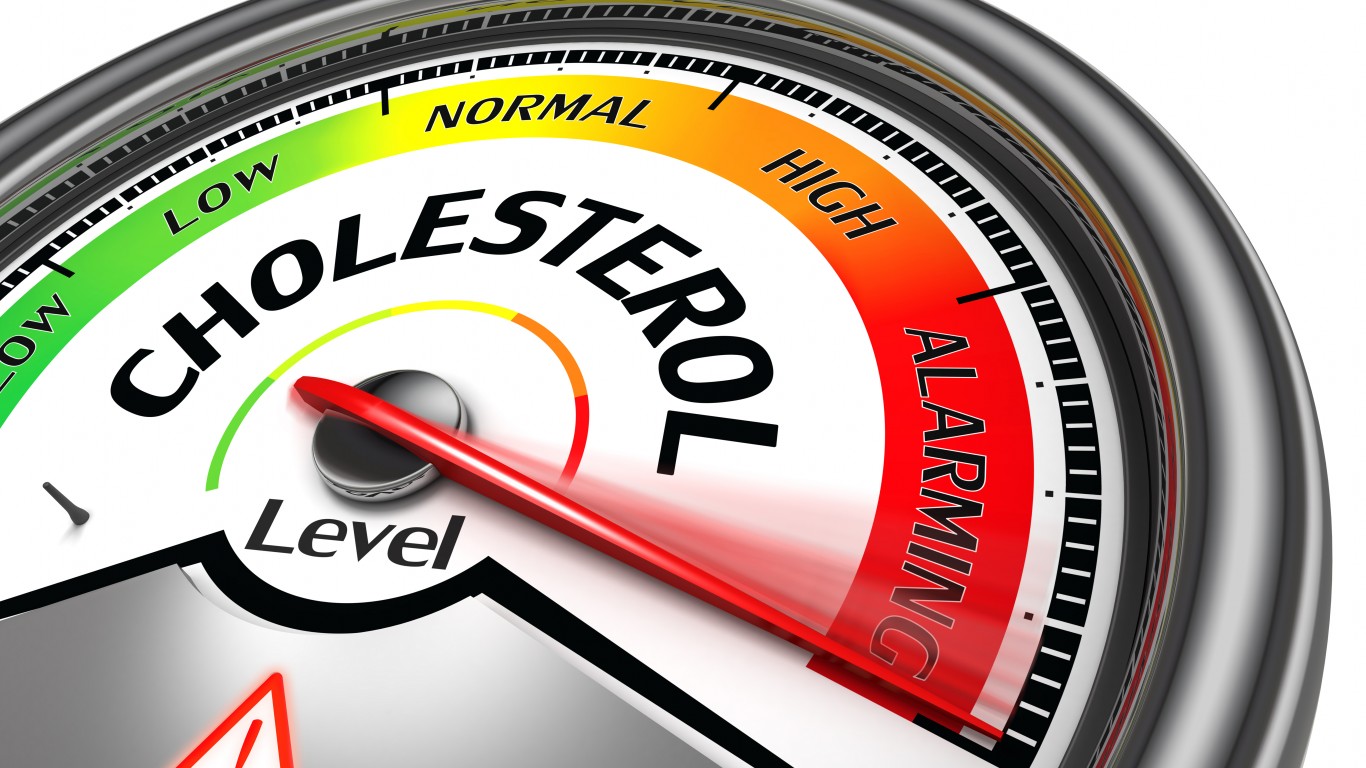
12. Some common conditions can lead to ED
Some chronic diseases that can lead to severe erectile dysfunction include heart disease, high cholesterol, poorly controlled diabetes, low testosterone (hypogonadism), alcohol or opioid abuse, obstructive sleep apnea, and even neurological diseases like Parkinson’s Disease or multiple sclerosis, Dhir explained. “There are more but these are the most common.”

13. Eat everything in moderation
Exercising portion control — as in eating everything in moderation — is one of the key behaviors men can adopt in maintaining good health, according to Dhir. Many healthy eating experts don’t believe in depriving yourself of any food as it only increases the risk of craving and eventually binging on unhealthy foods. Your body needs all major food groups. “You can’t eat only protein because then you’ll crave sugar too much,” said Jill Maher, a nutrition health coach in Scottsdale, Arizona.

14. Avoid processed foods
Most processed foods are often leached off of the essential vitamins and nutrients the body needs, and that can make a huge difference on weight and overall health. This is why eating less processed foods is one of the health resolutions doctors want people to keep. Read the labels and make sure there are no added sugars, sodium, and trans fats.
[in-text-ad-2]

15. Avoid saturated fats
Most Americans consume more than the recommended limits for saturated fat in their diet, according to the Food and Drug Administration. That limit is no more than 6% of one’s daily calorie intake, as per the American Heart Association — that is about 120 calories or 13 grams for a diet of 2,000 calories a day. Saturated fat can raise cholesterol levels, which increases the risk of heart disease.

16. Get plenty of exercise
One of the simplest advice Dr. Dhir recommended is to get plenty of exercise. “An active lifestyle cannot always overcome genetics, but it can certainly help every male prevent chronic disease and maximize vitality,” he added.
[in-text-ad]

17. Know what causes male infertility
Though men might think of infertility as a woman’s problem, a third of infertility problems are caused by male reproductive issues. Male infertility can be the result of low sperm production, abnormal sperm function, or blockages of sperm transport. Infections, swelling of the veins, cancer, hormonal imbalances, celiac disease, and prior surgeries are some of the possible causes of male infertility.

18. Certain types of hair loss can be stopped
Hair loss in men can be hereditary, due to hormonal changes, or caused by medical conditions or medications. One type of hair loss, alopecia areata, is when the hair falls out in patches. Scientists have determined that the condition may stem from insufficient amounts of vitamin D. Men should be screened for alopecia areata and vitamin D deficiency.

19. Read more often
Want to live longer? Then engage in more cognitive stimulating activities — something we tend to do less as we age. More frequent cognitive stimulating activity has been linked to longer life spans and reduced cognitive decline in later life. This pleasant pastime helps keep the brain about 10 years younger.
[in-text-ad-2]

20. Don’t cut carbs
The body needs each macronutrient — carbohydrates, fats, and protein — for optimal health. Carbs are the body’s main source of energy. You just have to know where to get them. Avoid simple carbs that can be found in candy and cookies and splurge on complex carbs that are found in fruits and vegetables. The source of the carbs is one of the crucial things nutritionists want you to know about calories.

21. Lay off the red meat
Red meat plays a big role in cardiovascular disease, and men tend to eat more red meat than women, according to Mehta. Still, heart disease is the number-one killer in both women and men. These are several other dangerous things experts links to heart disease.
[in-text-ad]

22. Eat plenty of fiber
Eating fiber is good for you. It benefits your digestion and cuts the risk of chronic diseases. It also helps lower your cholesterol. High cholesterol levels are linked to increased risk of heart attack. But recent research has shown that cholesterol and a favorite food for breakfast don’t increase the risk of stroke.

23. Get some sleep finally
Adults between the ages of 26 and 64 need 7 to 9 hours of sleep. But we’re not getting enough shuteye, according to the National Sleep Foundation, which says the average adult gets less than 7 hours of sleep per night. Lack of sleep can affect your emotional well being and the health of your brain and heart as well impact your immune system, mental acuity, and the ability to handle stress.
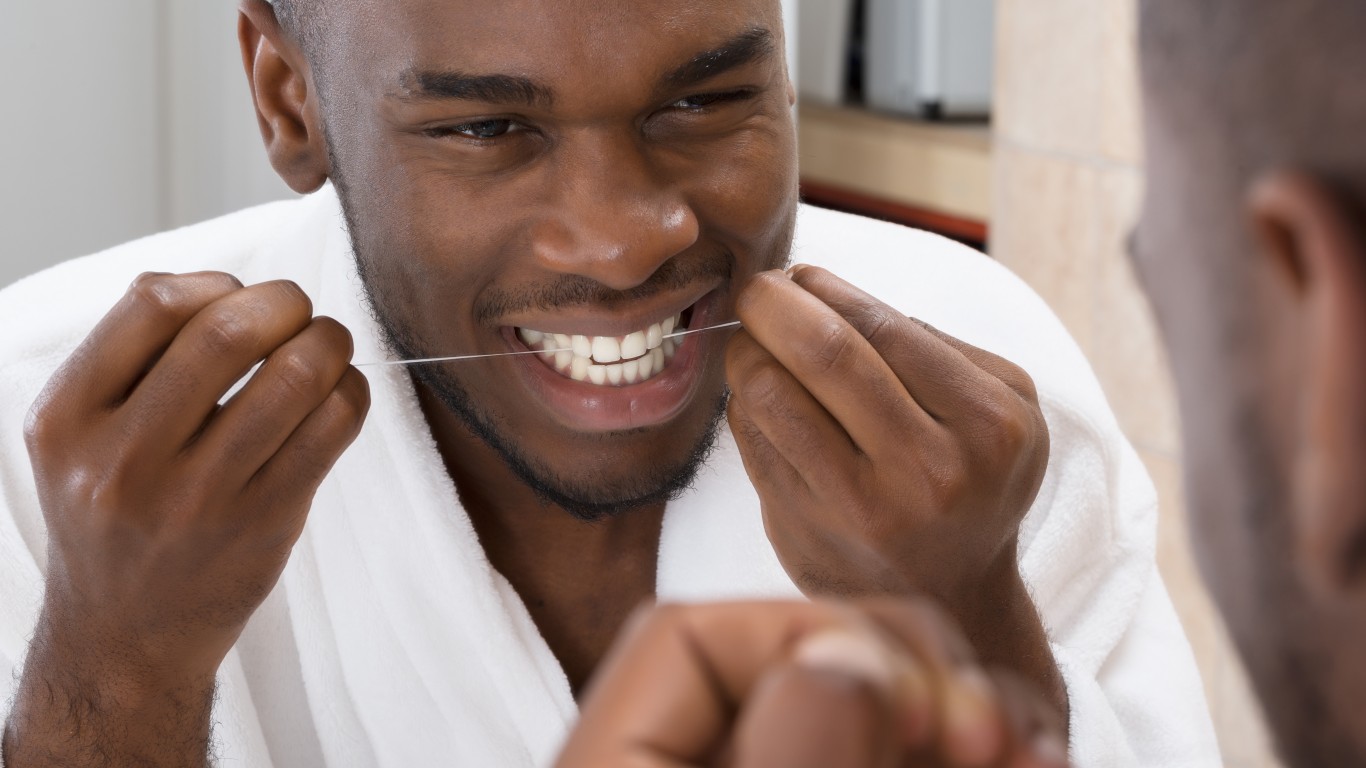
24. Floss to lower risk of cancer and impotence
Studies have shown that periodontal disease is higher among men than women. One factor that might explain this is that men tend to go to the dentist less frequently than women. Periodontal disease is associated with cardiovascular disease because both conditions are inflammatory. Also, men with periodontal disease may be at increased risk of impotence because a prolonged inflammatory condition can damage blood vessels. Additionally, men with chronic gum disease are more likely to develop cancer.
[in-text-ad-2]

25. Know your family’s medical history
Lifestyle is one factor that can affect the risk of many diseases, but it’s not the only one. Genetics is crucial, too, and there’s nothing you can do about it except be aware of it. Knowing what medical conditions may run in the family may help determine whether you or future generations of your family are at risk of cancer, diabetes, heart disease, asthma, and even hair loss. This is valuable information you can use to adjust your lifestyle so you minimize the risk of developing any of these conditions.

26. Ask about cancer screenings
Cancer screenings are crucial to men’s health because screenings can detect the disease in its early stages, even before symptoms of the disease manifest themselves. Among the cancers that can be screened are prostate cancer, the second most common cancer in men after skin cancer, and testicular cancer, which impacts men most frequently between the ages of 20 and 54.
[in-text-ad]

27. Vary your workouts to build muscle
The body starts to lose muscle mass after the age of 30, and inactive people can lose up to 5% of muscle mass over a 10-year period. Ideally, you want to replace what’s lost by working out and being more active because it helps keep you fit and strong. Less muscle could result in less agility, which could increase the risk of falls and fractures. To build muscle you need to do strength training, which includes resistance training — either weight lifting or body-weight exercises. Muscle also plays an important role in controlling metabolism, which is one of the best ways to lose weight or keep it off as you age.

28. Strengthen your core
The average waist circumference for men in this country has crept up by more than an inch over the years, from 39 to 40.2 inches, according to recent statistics from the CDC. Belly fat is dangerous because it includes visceral fat, which is fat stored in the abdomen near the liver, pancreas, and intestines. The extra fat around the waist increases the risk of developing heart disease, diabetes, and sleep apnea. This and other reasons are why you should worry about your waist more than your weight.
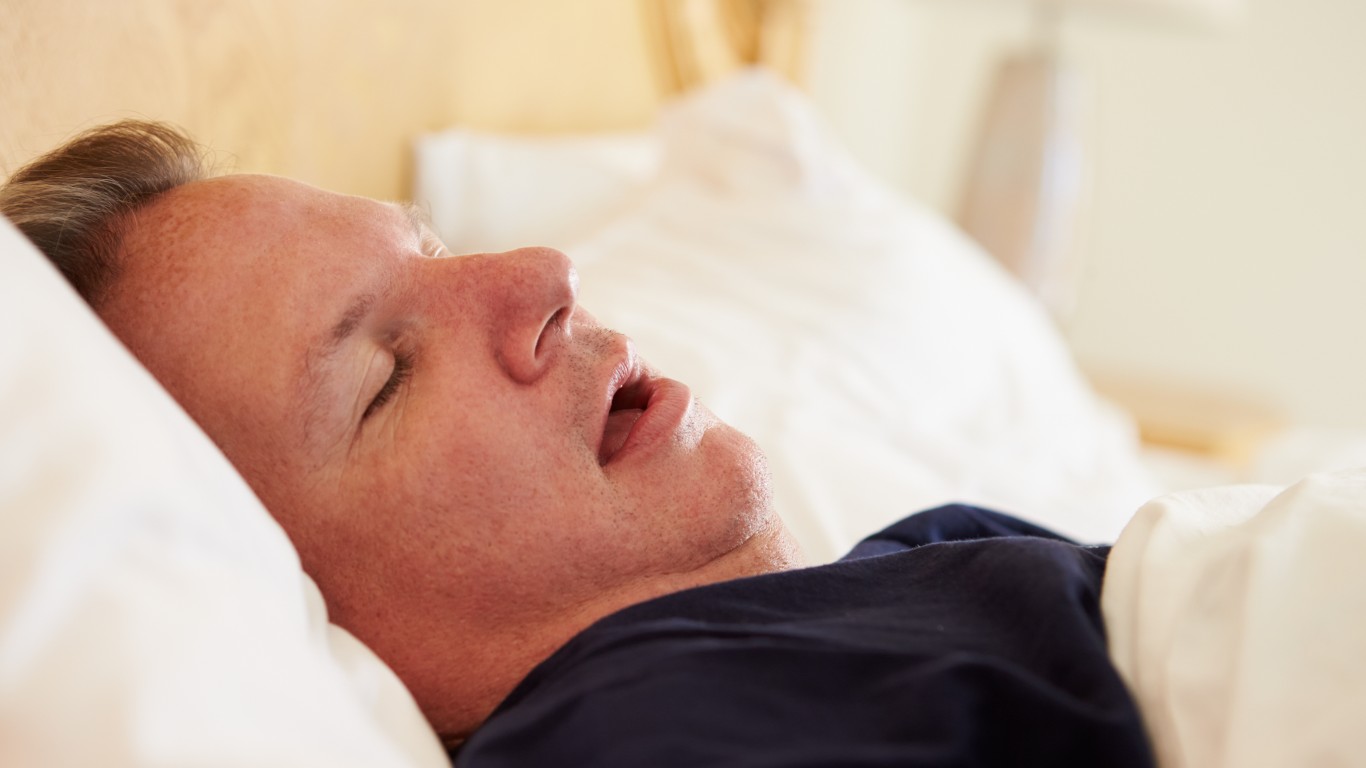
29. Find out if you’re snoring
Men snore more than women. Part of the reason is the physiological difference — men are born with narrower air passages than women. But it is also lifestyle. Men tend to drink more alcohol and smoke more than women. This exacerbates snoring because alcohol relaxes the muscles around the throat, and smoking contributes to inflammation around the airways. Also, more men are obese than women, and excessive weight gain can increase the odds of snoring because it leads to poor muscle tone and adds tissue to the neck and throat. (These are the world’s most overweight countries.)
[in-text-ad-2]

30. Drink green tea to help lower the risk of prostate cancer
There is some evidence suggesting that green tea may help prevent prostate cancer. Green tea contains polyphenols, which help the production of healthy microbes in the colon. Polyphenols include the antioxidant catechins, which some studies have shown protects against cardiovascular disease and some types of cancer, including prostate cancer. In the United States, about 11% of all men will be diagnosed with prostate cancer, though most who are diagnosed with it will not die from it.

31. Blow your nose the right away
If you have a cold and you are congested, don’t sniffle the mucus back into your head. Blow your nose the proper way, by placing a finger over one nostril while gently blowing the other. Blowing your nose too hard will push phlegm into ear passages, causing an earache.
[in-text-ad]
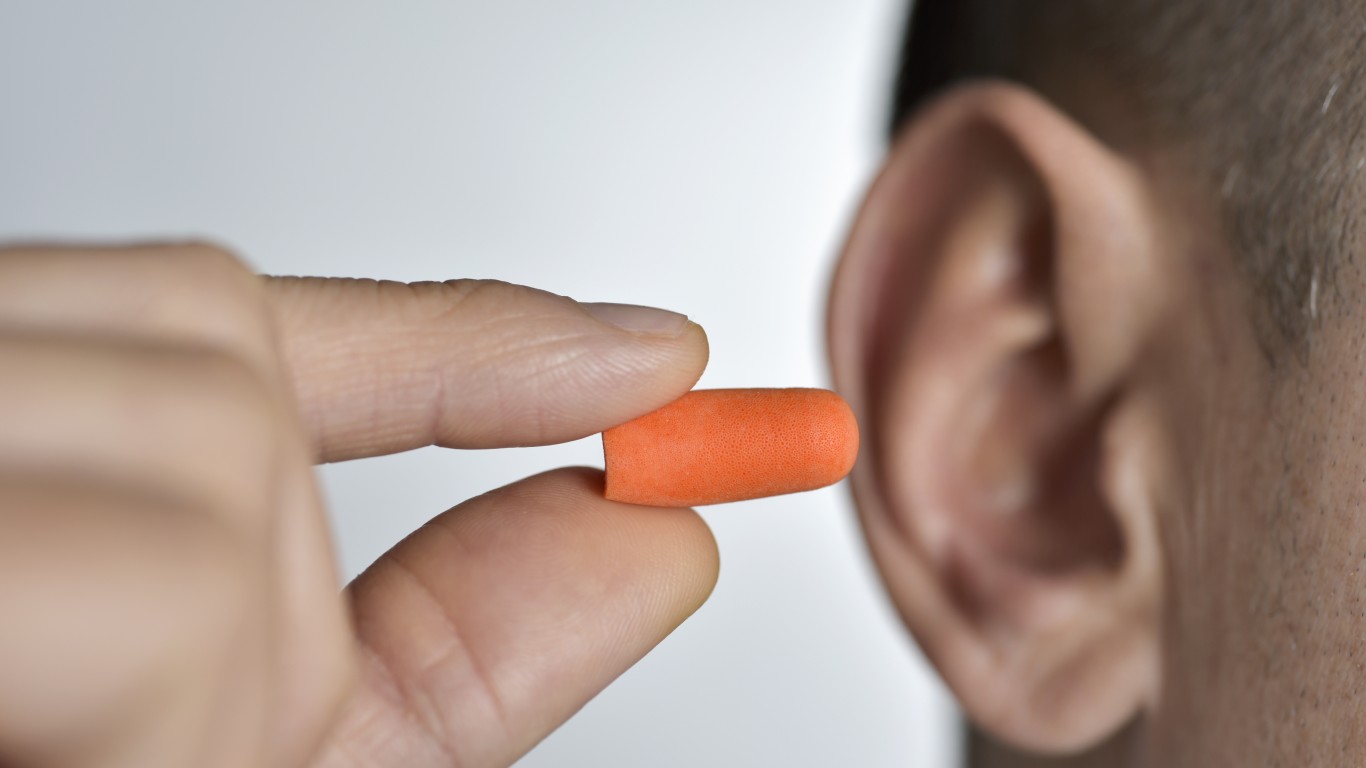
32. Minimize your exposure to loud noises
Hearing loss is common as people get older. But men between the ages of 20 and 69 years are about twice as likely to develop auditory issues than women, according to the National Institute on Deafness and Other Communication Disorders. Don’t listen to loud music with headphones and wear earplugs for protection during activities that expose you to loud noises.
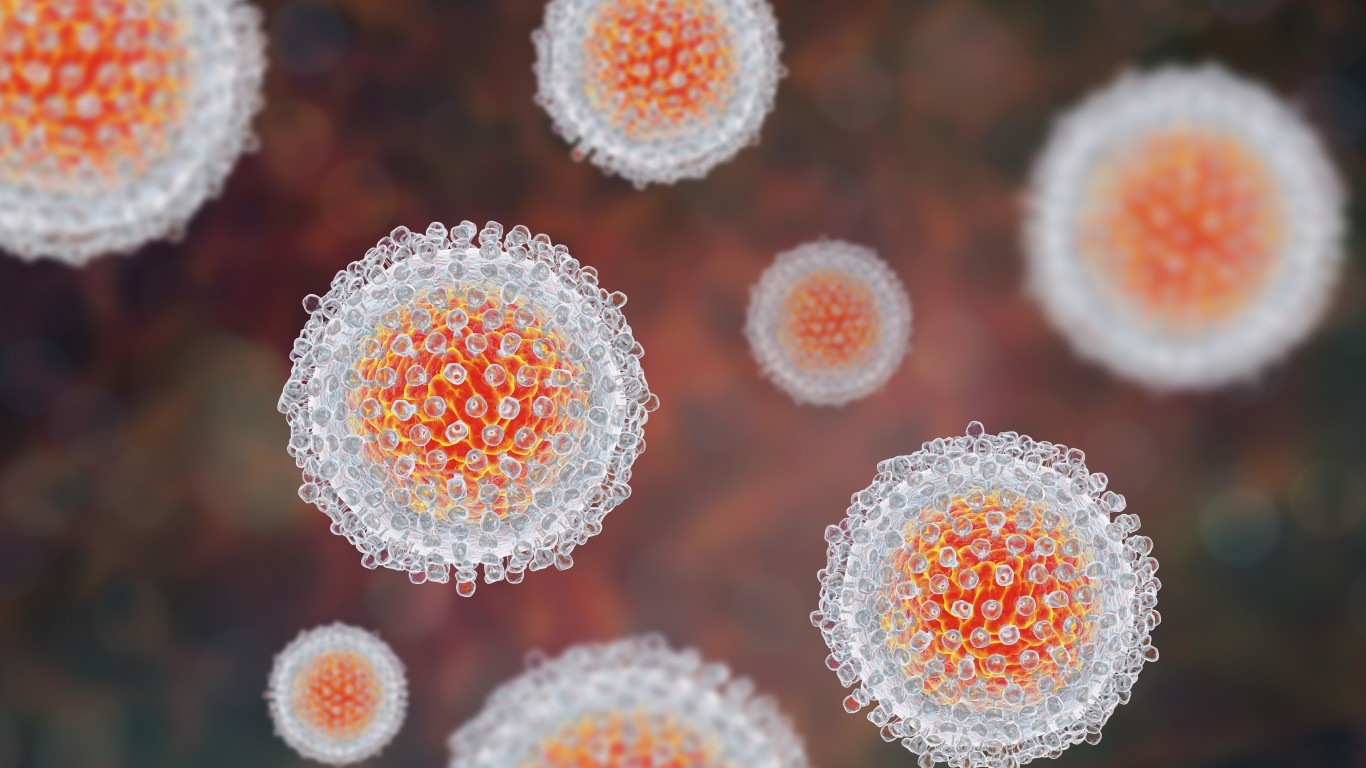
33. Get tested for Hepatitis C
Hepatitis C is a liver disease caused by the hepatitis C virus. The condition causes an inflammation in the liver that limits the organ’s ability to remove toxins from the body. For reasons not known to scientists, men are less able to fight off the virus than women. Men can prevent contracting the virus by wearing protection during sex, wearing gloves when coming into contact with open wounds, and not sharing toothbrushes or drug paraphernalia.

34. Stop smoking
In the United States, 15.8% of male adults smoke, compared with 12.2% for women. Lung cancer, one of the health risks from smoking, is the leading cause of death among men in the U.S. Boys start to smoke because of peer pressure or as a form of rebellion. Tobacco-related mortality is one of at least 20 health problems that afflict more men than women.
[in-text-ad-2]

35. Know what counts as alcohol
Mehta says men tend to segment alcohol in various categories and don’t include beer as alcohol. Even though beer might not have the alcohol content of other liquors, it still contains alcohol, which should be consumed in moderate quantities. And not all beers are created equal. Some Indian Pale Ales have alcohol content of as much as 20%. Men who drink beer — and men drink more alcohol than women — need to know that beer can pack a wallop.
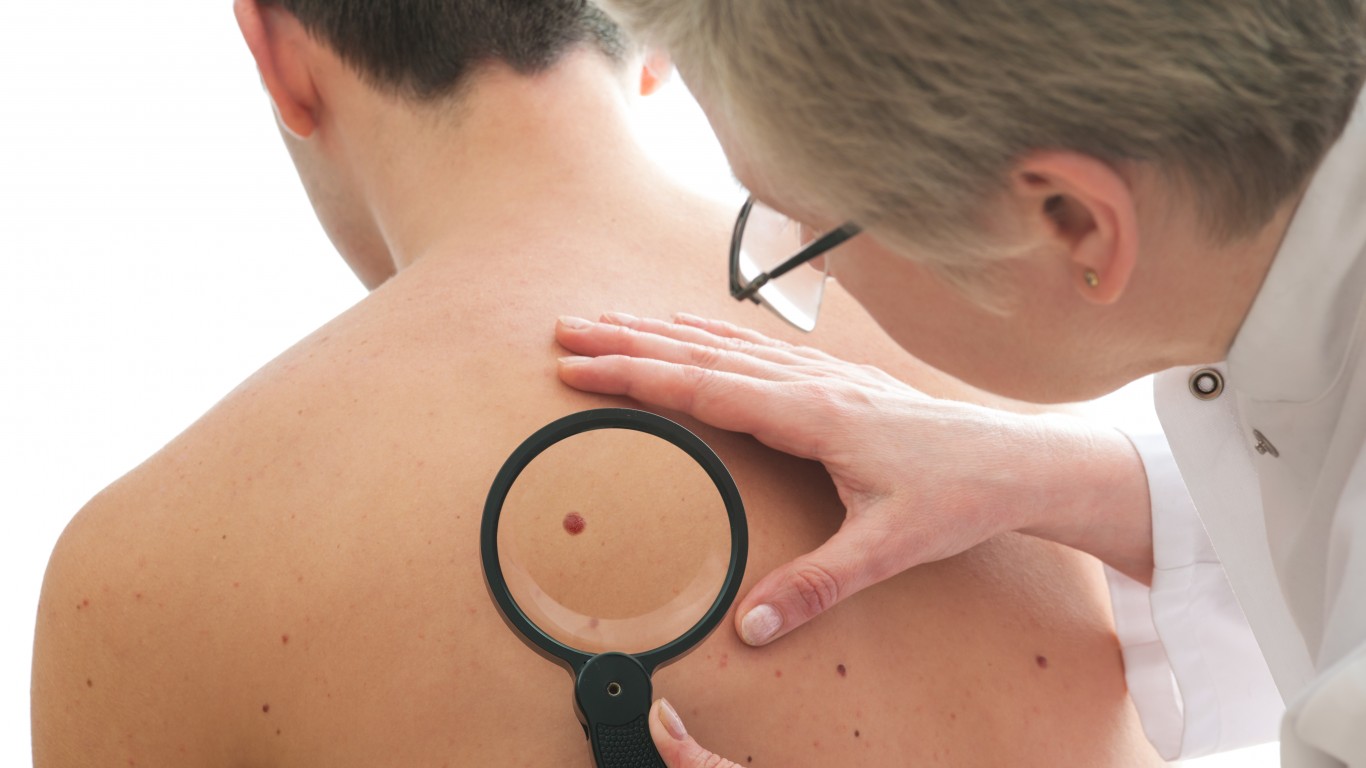
36. Go get that new mole on your skin checked
Moles are growths on the skin that are typically brown or black. Moles in themselves are not cancerous, but they can develop into melanoma, the most dangerous form of skin cancer. The rate of melanoma has doubled over the last three decades, according to the CDC. By age 50, men are more likely than women to get melanoma. One possible explanation is that men know less about their skin and therefore don’t protect it as well. They should check their moles frequently and go to a dermatologist to see if the moles change in size and color over time, or have an irregular border.
[in-text-ad]
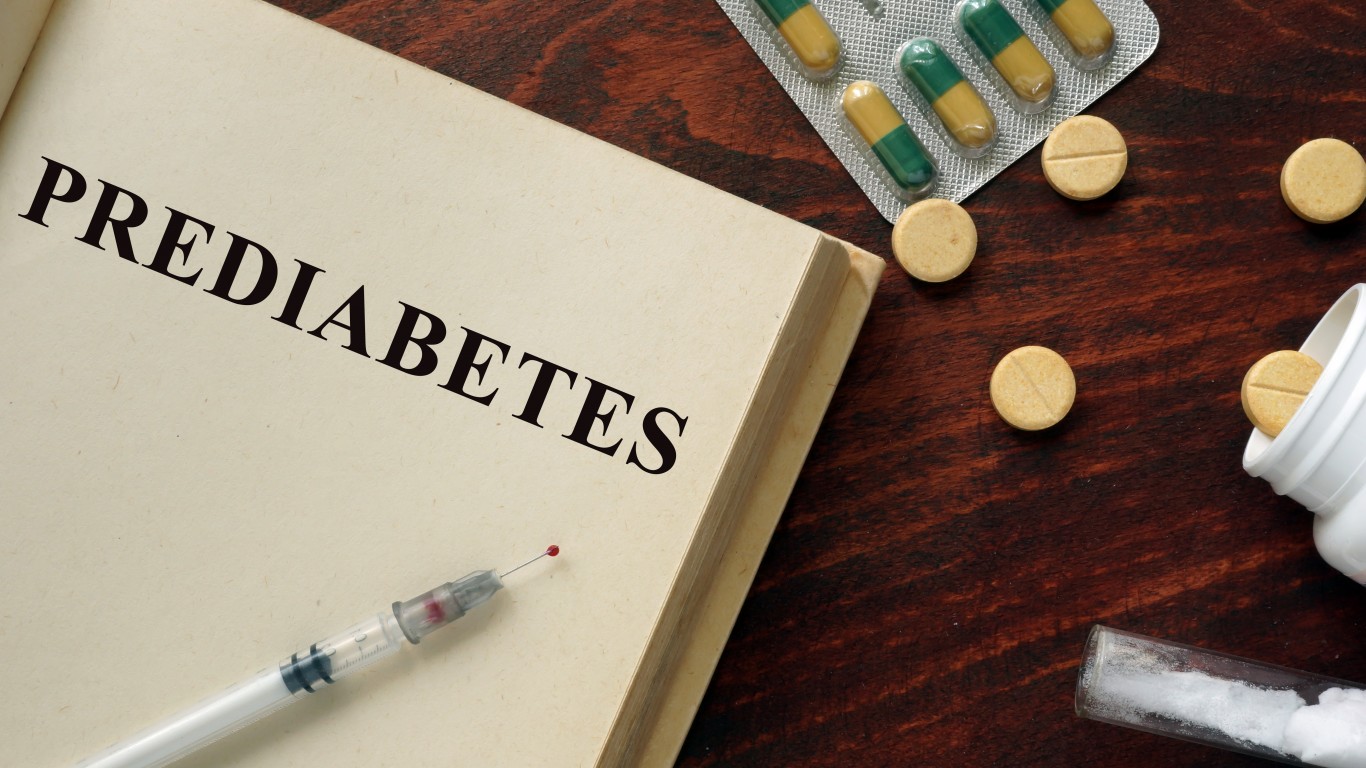
37. Check if you have prediabetes
The American Diabetes Association estimates that in 2015, 84.1 million Americans 18 and older had pre-diabetes. Having this condition doesn’t mean you will get diabetes. However, the risk of insulin resistance (when cells become resistant to the action of insulin — the hormone that moves sugar) for men rises when their waistline exceeds 40 inches. The risk of prediabetes increases after age 45, as we exercise less, lose muscle mass, and gain weight. Family history and genetics also play a role in prediabetes. You can prevent prediabetes by eating healthier foods, being more physically active, losing weight, and watching your cholesterol and blood pressure. These are 10 warning signs you might have diabetes.

38. Lose the belly fat
Belly fat in men is a serious problem. It is not just an added midsection cushion known as subcutaneous fat, it is also visceral fat, which is deeper inside your abdomen, surrounding your internal organs. If a man’s waist measurement exceeds 40 inches, that is an indication of too much belly fat. This can lead to cardiovascular disease, type 2 diabetes, colorectal cancer, sleep apnea, and high blood pressure. To reduce belly fat, men should eat a healthy diet with a focus on plant-based foods and fish, while limiting dairy and meat intake. They should practice food portion control; avoid sugary beverages; and get more exercise.

39. Take a hydration break from drinking
There is an old joke about drinking beer: you don’t buy it, you rent it. That means that when you’re drinking a lot with your pals — and men drink more than women — you are urinating frequently because alcohol is a diuretic, and urinating often can lead to dehydration. That can contribute to some hangover symptoms, such as thirst and dry mouth. So if you’re drinking heavily, take a break and drink water between drinks and have a big glass of H2O before you go to bed.
[in-text-ad-2]

40. Lift weights
Testosterone is a hormone mainly produced in men by the testicles. It helps maintain bone density, body hair, and muscle mass. Once men pass 40 years old, they lose about 1% of their testosterone per year. A natural way to build it up is through weight training, such as multi-joint exercises that focus on the largest muscle groups. Those exercises include squats, bench presses, and push-ups.
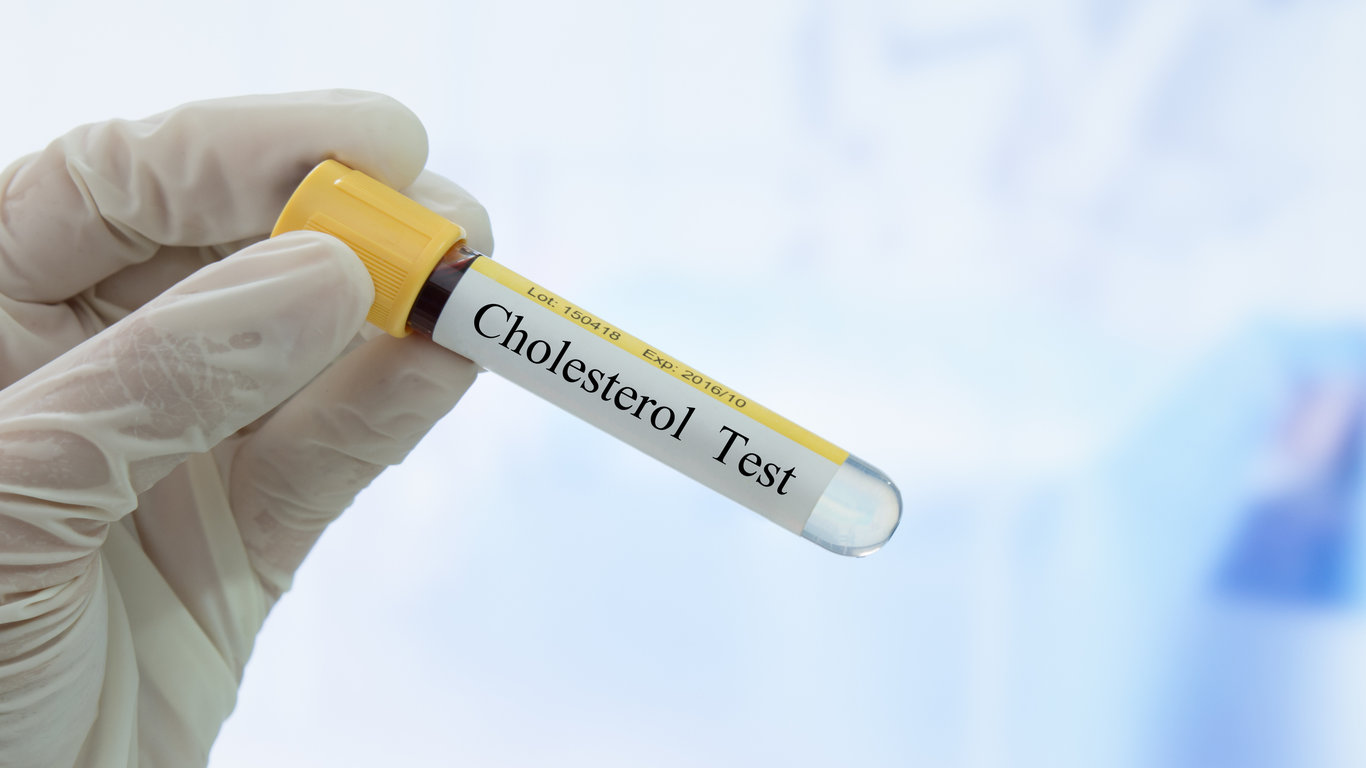
41. Take care of cholesterol
Monitoring your cholesterol is not a concern just for older people. New research from the Duke Clinical Research Institute indicates that even slightly high cholesterol levels in healthy adults between 35 and 55 can affect their long-term heart health, with every decade of elevated cholesterol levels increasing their chances of heart disease by 39%. So be sure to monitor your cholesterol level and change your diet if necessary. Your doctor may suggest medication. High cholesterol and 27 other dangerous things have been linked to heart disease.
[in-text-ad]

42. Wear a seatbelt
About 51% of male passengers who were killed in car crashes in 2017 did not wear seat belts, according to the National Highway Traffic Safety Administration. People are taking to heart the slogan that seatbelts save lives. A recent University of Washington report found that 86% of Americans used a seatbelt in 2012, an 8.4% increase from 2002. But there’s room for improvement. The study said that only 2.2% of U.S. counties meet the government’s safety goal of 92% seatbelt usage.
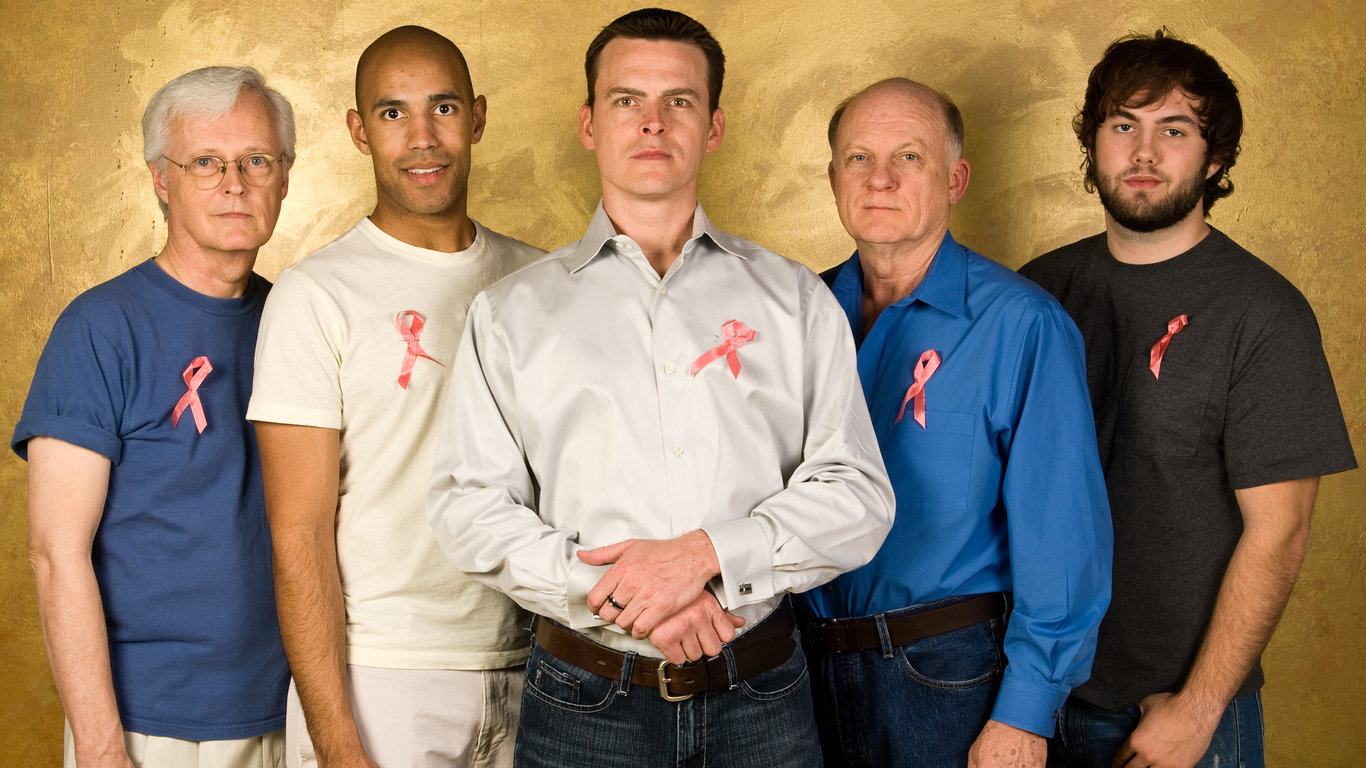
43. Male breast cancer is on the rise
Breast cancer has been a scourge of women. Male breast cancer, however, is increasing. Researchers are not certain whether this is because the disease is actually becoming more common among men or because men better understand the symptoms and report them — these are the most common cancers in men and women. Symptoms of breast cancer in men include a lump felt in the breast, nipple pain, an inverted nipple, nipple discharge (clear or bloody), sores on the nipple and areola, and enlarged lymph nodes under the arm.

44. Check if you have an enlarged prostate
The prostate is the gland in men that produces one part of semen. Over time, and for reasons not fully understood, this gland can become enlarged, leading to a condition called benign prostatic hyperplasia (BPH). This condition obstructs the flow of urine through the urethra, putting pressure on the urethra and causing it to narrow. The bladder muscle becomes more sensitive and begins to contract, causing men to urinate more frequently and making it more difficult to urinate. Various treatments can address enlarged prostate symptoms, including medications, minimally invasive procedures, and surgery.
[in-text-ad-2]

45. Stop chewing tobacco
About 3.8% of adults in the United States are smokeless, or chewing, tobacco users. The use of smokeless tobacco is much higher among men than women, 6.8% compared with 1.0%, respectively. Smokeless tobacco poses health risks such as cancers of the mouth, esophagus, and pancreas. Other health concerns are gum disease, tooth decay, and tooth loss. Tony Gwynn, the Hall of Fame baseball player who chewed tobacco for decades, died of parotid cancer, a malignancy of the salivary gland, in 2014.
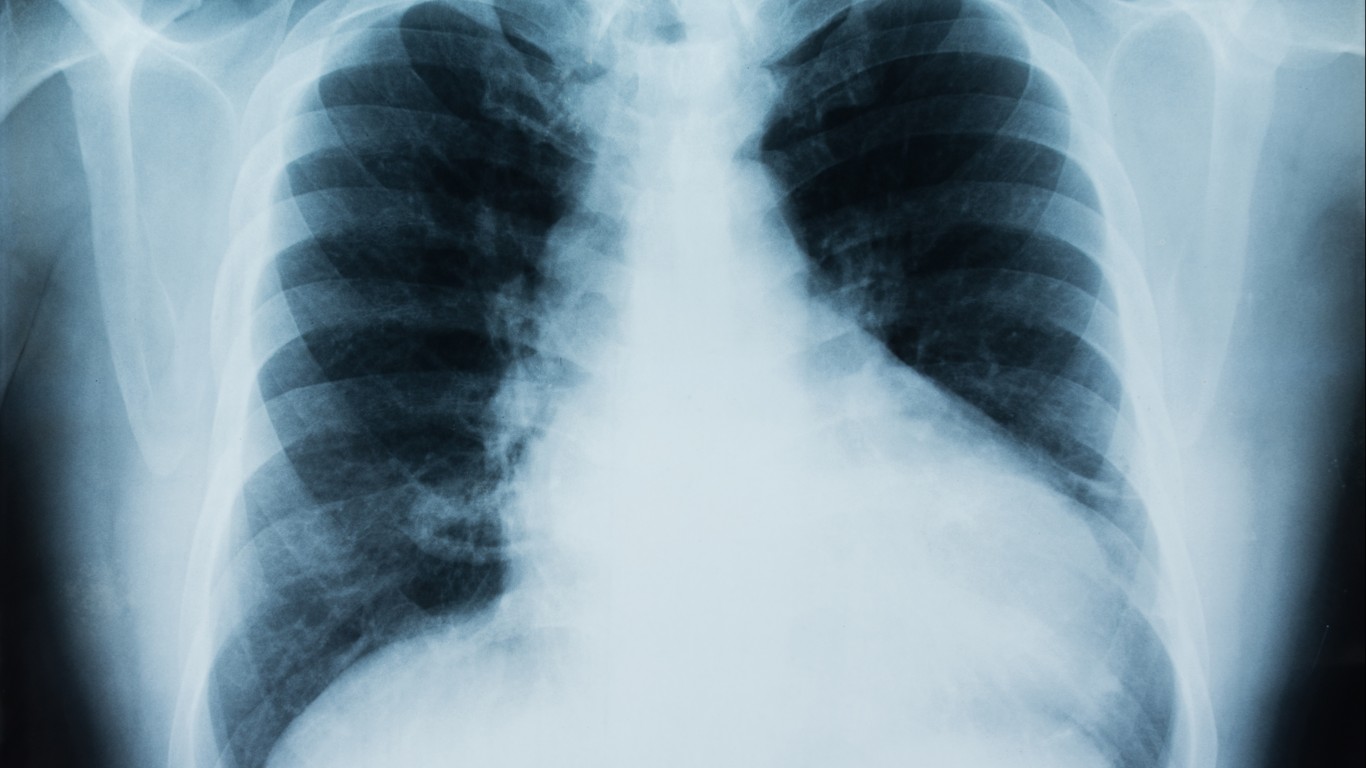
46. Get screened for lung cancer
Lung cancer is the leading cause of cancer deaths among men. That’s the bad news. The good news is that death rates from lung cancer in men have been declining, dropping 2% a year from 1994 to 2006. About 90% of lung cancers in men are from smoking. Certain occupations, such as painters, metal workers, pipe fitters, and plumbers, have also been linked to lung cancer. Men are advised to quit smoking, test their homes for radon, be conscious of occupational causes of lung cancer, exercise, and eat a healthy diet.
[in-text-ad]

47. Recognize symptoms of depression
Depression is a condition men are much less likely to talk about or seek treatment for. But it is common and it’s very debilitating. Men tend to lose interest in activities they find pleasurable, such as sex. They feel sad, are irritable, feel tired, experience interrupted sleep, and contemplate suicide, among other symptoms. Treatment for depression includes medication and psychotherapy, as well as more exercise and a change to more healthful eating habits.

48. Don’t disregard low libido
Though it’s not unusual to lose interest in sexual activity periodically, sustained low libido in men might be a health issue. Conditions associated with decreased libido include type 2 diabetes, obesity, depression, high blood pressure, and high cholesterol levels. Reduced levels of testosterone are also associated with reduced libido.

49. You don’t have to be social all the time
We associate greater social interaction as a positive, especially when we are younger, because it develops social skills and builds social support. Women tend to be more social than men. However, a University of Buffalo study found that some social withdrawal — what the study calls unsociability — can be linked to greater creativity in individuals.
[in-text-ad-2]

50. Do you still have ADHD?
ADHD — attention deficit/hyperactivity disorder — is a condition associated with children. But adults struggle with it as well. More men than women have ADHD, according to a European ADORE (Attention-Deficit Hyperactivity Disorder Observational Research in Europe) study. The condition is defined by symptoms of inattention, hyperactivity, and impulsivity. Treatment for the disorder can involve medication, education, training, and psychological counseling. You can find out more about the health problems that affect more men than women.
Are You Ahead, or Behind on Retirement? (sponsor)
If you’re one of the over 4 Million Americans set to retire this year, you may want to pay attention.
Finding a financial advisor who puts your interest first can be the difference between a rich retirement and barely getting by, and today it’s easier than ever. SmartAsset’s free tool matches you with up to three fiduciary financial advisors that serve your area in minutes. Each advisor has been carefully vetted, and must act in your best interests. Start your search now.
Don’t waste another minute; get started right here and help your retirement dreams become a retirement reality.
Thank you for reading! Have some feedback for us?
Contact the 24/7 Wall St. editorial team.
 24/7 Wall St.
24/7 Wall St. 24/7 Wall St.
24/7 Wall St. 24/7 Wall St.
24/7 Wall St.
